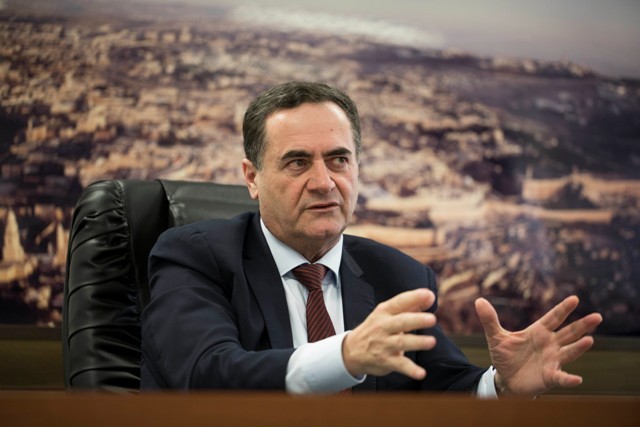Instead, Yisrael Katz wants to apply sovereignty to the Jewish communities of Judea and Samaria and develop the area.
By Batya Jerenberg, World Israel News
Israel’s foreign minister took a hardline stance against a Palestinian state in an interview Friday in the Makor Rishon weekly while promoting his idea to invest billions in Judea and Samaria.
“I am against a Palestinian state in any way, shape or form” in Judea and Samaria, he said unequivocally, adding that the settlement enterprise there must be better protected.
Asked if that meant applying Israeli sovereignty to the area, he said, “My approach is adopted from the [2017] Likud Central Committee decision. I’m for the Greater Jerusalem law, which talks of including places that everyone understands that they have to be part of the State of Israel. The goal has to be to apply sovereignty to the Judean and Samarian villages.”
Katz also has practical plans to help attach Israel’s heartland to the center of the country.
“My approach is that nothing is going to be handed over [to the Palestinians] and that [Judea and Samaria]) need to be developed. I have pushed plans in the Transportation Ministry to invest billions in Judea and Samaria. The vision is to connect it to Jerusalem, Afula, and the central region with roads and light rail.”
No state in Gaza either
The senior Likud politician’s rejection of a Palestinian state extends even to the Gaza Strip, which has been under total Palestinian control since Israel evacuated the Jewish communities there in 2005.
“Unlike many on the right, I’m against a Palestinian state in Gaza,” he said.
In his view, what Israel really needs to do in the case of the coastal enclave run by the Hamas terrorist organization is to relinquish any sign of civilian responsibility over the area.
“The fact that the [office of the] Coordinator of Government Activities in the Territories (COGAT) is responsible for Gaza and travels to donor countries to raise funds for it, is delusional,” he said.
“The [2005] Disengagement failed in two main respects. The first and better known is that the evacuation created terrorist nests instead of their building holiday villages, as [late president Shimon] Peres dreamed. But the strategic failure is that Egypt did not take civilian responsibility for Gaza.”
“The Egyptians don’t want the Gazans, and they know why,” he continued, apparently referring to the fact that Hamas is affiliated with the Muslim Brotherhood, which has been behind many terrorist attacks in Egypt, especially in recent years.
“That’s why they will not have a port and airport in the Sinai [for the Palestinians]. The Americans have been trying everything for the last two years. The Egyptians are absolutely not having it.”
Mattot Arim, an Israeli NGO which takes the position that there should be peace-for-peace and not land-for-peace, said that the foreign minister’s statement opposing a Palestinian state was essential for regional stability.
“Two-statism is like jumping on a bandwagon,” said Mattot Arim head Susie Dym.
“To Western ears, two states sounds like peaceful co-existence. No one talks or even thinks about what a violent failed state, a bike ride away from Tel-Aviv and Ben Gurion airport, would really be and do. Well-intentioned people need well-intentioned warnings. That’s what Israel’s foreign minister supplied.”


